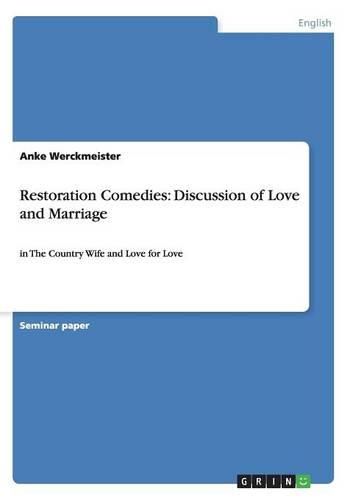Readings Newsletter
Become a Readings Member to make your shopping experience even easier.
Sign in or sign up for free!
You’re not far away from qualifying for FREE standard shipping within Australia
You’ve qualified for FREE standard shipping within Australia
The cart is loading…






Seminar paper from the year 2007 in the subject English Language and Literature Studies - Literature, grade: 2,3, Free University of Berlin (Institut fur Englische Philologie), course: Restoration Comedies, language: English, abstract: Two Restoration Comedies that I want to discuss are William Wycherley’s The Country Wife (1675) and William Congreve’s Love for Love (1695). Both plays were written in a time when libertinism prevailed and male stereotypes like rakes and fops and female stereotypes like wives and virgins were popular. Needless to say, both plays not only deal with Restoration society but also with its problems, concerns, and difficulties at the time. And especially, Love for Love, which was written fairly at the end of the Restoration era, still is a conventional play in terms of being libertine-satirical but it already includes some features of sentimentalism. So it is not a postponement from libertinism to sentimentalism yet, but I want to argue in this essay that both plays are rather conventional libertine Restoration plays which include features of early sentimentalism.
$9.00 standard shipping within Australia
FREE standard shipping within Australia for orders over $100.00
Express & International shipping calculated at checkout
Seminar paper from the year 2007 in the subject English Language and Literature Studies - Literature, grade: 2,3, Free University of Berlin (Institut fur Englische Philologie), course: Restoration Comedies, language: English, abstract: Two Restoration Comedies that I want to discuss are William Wycherley’s The Country Wife (1675) and William Congreve’s Love for Love (1695). Both plays were written in a time when libertinism prevailed and male stereotypes like rakes and fops and female stereotypes like wives and virgins were popular. Needless to say, both plays not only deal with Restoration society but also with its problems, concerns, and difficulties at the time. And especially, Love for Love, which was written fairly at the end of the Restoration era, still is a conventional play in terms of being libertine-satirical but it already includes some features of sentimentalism. So it is not a postponement from libertinism to sentimentalism yet, but I want to argue in this essay that both plays are rather conventional libertine Restoration plays which include features of early sentimentalism.